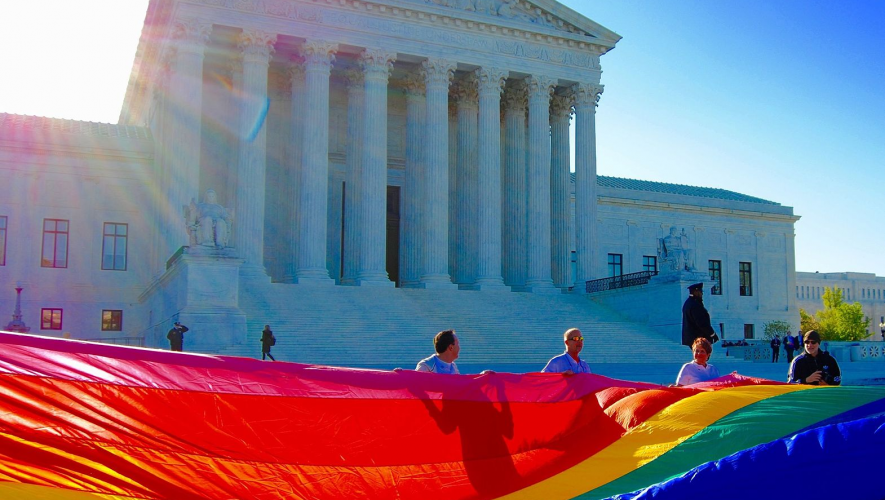The Supreme Court was always an important factor in the 2020 presidential election. Even before Justice Ruth Bader Ginsburg’s death in September, it was unlikely she would survive another presidential term. And with three justices aged seventy or older, whoever wins the presidency will probably get at least one appointment. Ginsburg’s passing made the Supreme Court a cornerstone issue this cycle, but the Court’s direction has always been at stake.
Ginsburg died just forty-six days before the general election; back in 2016, Senate Majority Leader Mitch McConnell delayed Judge Merrick Garland’s nomination for nearly three hundred days because he didn’t want to fill the seat in an election year. Using this justification, Democrats lobbied the Republican Senate majority to bar President Trump from confirming an appointment. Yet, McConnell expressed that the Senate would consider a Trump nominee, illustrating that he doesn’t care about acting hypocritical.
Trump nominated Amy Coney Barrett to fill Ginsburg’s seat. Despite two members of the Senate Judiciary Committee testing positive for COVID-19, hearings began on October 12, and McConnell has announced that the full Senate will vote on her nomination the week of October 26—just days before the election.
Because there are no term limits, a new justice will determine the direction of the Court for several decades. If Barrett is confirmed, she will tilt the Court 6–3 in conservatives’ favor––a majority that future elections will be hard-pressed to overturn.
Perhaps the greatest fear for most Americans is that a rightward shift will affect Roe v. Wade, the 1973 decision which guaranteed access to safe, legal abortion nationwide. However, even more than that is at stake here—a week after Election Day, the Supreme Court will hear a case about the Affordable Care Act, which could be overturned by a conservative court. Obergefell v. Hodges, which legalized gay marriage nationwide in 2015, would also be threatened.
A 5–4 majority decided Obergefell. Since then, the majority side has lost two votes, Ginsburg and Anthony Kennedy—a conservative-leaning justice who often served as a crucial swing vote. After Brett Kavanaugh replaced the retiring Kennedy in 2018, only Stephen Breyer, Elena Kagan, and Sonia Sotomayor remained from the Obergefell majority.
On October 5, the Supreme Court allowed a lawsuit to proceed against Kim Davis, a former Kentucky county clerk jailed in 2015 for denying marriage licenses to gay couples on the grounds of religious belief. Though Justices Clarence Thomas and Samuel Alito—dissenters in Obergefell—agreed with the Court’s decision, they wrote that Davis was “one of the first victims of this Court’s cavalier treatment of religion in its Obergefell decision.” They restated their original dissent that Obergefell threatens the religious liberty those who object to same-sex marriage on religious grounds, saying they would “find it increasingly difficult to participate in society without running afoul of Obergefell and its effect on other antidiscrimination laws.”
Davis was not the first person to claim that her religious beliefs shielded her from antidiscrimination laws, and she certainly won’t be the last. In 2017, the owner of Masterpiece Cakeshop argued that his religious beliefs permitted him to deny service to a gay couple. The Court did not rule on whether this denial was legal. Instead, the 7–2 decision focused on procedural, case-specific details and did not set any precedent.
This past term, the Supreme Court ruled in a 7–2 decision that religious institutions—including schools—are exempt from employment discrimination lawsuits. This year, the Court will hear arguments on whether adoption agencies should be allowed to reject LGBTQ families on religious grounds. The Trump administration filed a 35-page amicus brief, arguing that the Court should enable this discrimination.
Religion does not grant anyone a free pass to discriminate. But Davis and other conservatives still tried to justify her prejudice and bigotry under the guise of “religious liberty.” Prioritizing religious liberty could reverse the progress we’ve made over the past decade to secure LGBTQ rights.
The Supreme Court surprised some on the left when they decided in June 2020 that Title VII, the portion of the Civil Rights Act that prohibits discrimination on the basis of sex, applies to LGTBQ discrimination as well. The majority was not as slim as Obergefell—it was a 6–3 decision, with Chief Justice John Roberts and Justice Neil Gorsuch (a Trump appointee) joining the four liberals. But this victory does not mean that Obergefell and other antidiscrimination rulings will be maintained, especially under a 6–3 conservative court.
Roberts and Gorsuch’s decision to protect LGBTQ rights in one case does not ensure that they always will. If a satisfactory challenge makes its way to the Supreme Court, they could very well rule that religious freedom allows people like Kim Davis to continue to discriminate.
Thomas described the Obergefell decision as an “alteration of the Constitution” that would spell “ruinous consequences for religious liberty.” He and Alito believe that public employees should be able to deny marriage licenses on the basis of their religious beliefs, and that this right supersedes antidiscrimination laws. Not only do they hold religious liberty above antidiscrimination, but their assault on Obergefell intends to impose Christian morality on the whole country—directly countering the First Amendment they treasure so deeply, which outlaws the adoption of a national religion.
The 2016 Republican party platform pledged to reverse Roe and Obergefell, describing Obergefell as “lawless.” They referred to the Supreme Court justices who ruled in favor of marriage equality as “five unelected lawyers”—although they seem perfectly fine with the prospect of these “unelected lawyers” stripping away healthcare and voting rights.
If Trump seats a third justice, the rights of all Americans to make personal decisions about reproduction and marriage hang in the balance. Barrett has defended the dissenters of Obergefell, spread transphobic rhetoric, and opposed reproductive rights. Even if her nomination stalls, any Trump appointee would likely hold the same hateful beliefs.
There’s no telling what other cases may make their way to the Court in the decades to come. A 6–3 conservative majority could have dire consequences for LGBTQ rights, healthcare, voting rights, gun safety laws, and countless other social and human rights issues.
The right to religious freedom in this country should not overshadow the right of everyone to live a discrimination-free life. Churches can refuse to recognize same-sex marriages, but they cannot demand that the state do the same. A marriage in the Catholic Church may be defined as the union between a man and a woman, but that doesn’t change the legal definition, which encompasses same-sex unions.
It was Davis’s job to issue marriage licenses, regardless of her beliefs. Davis is not the “victim” that Thomas paints her to be—she is a bigot. Hate founded in religion is still hate.
The separation of church and state requires that religious beliefs not impede religiously neutral laws, including those that prohibit discrimination. But the continuous rightward tilt of the Supreme Court means that decisions ensuring the protection of civil rights for all must be defended with vigor. As it stands, the fate of Obergefell v. Hodges—and of all antidiscrimination—hangs in the balance.



